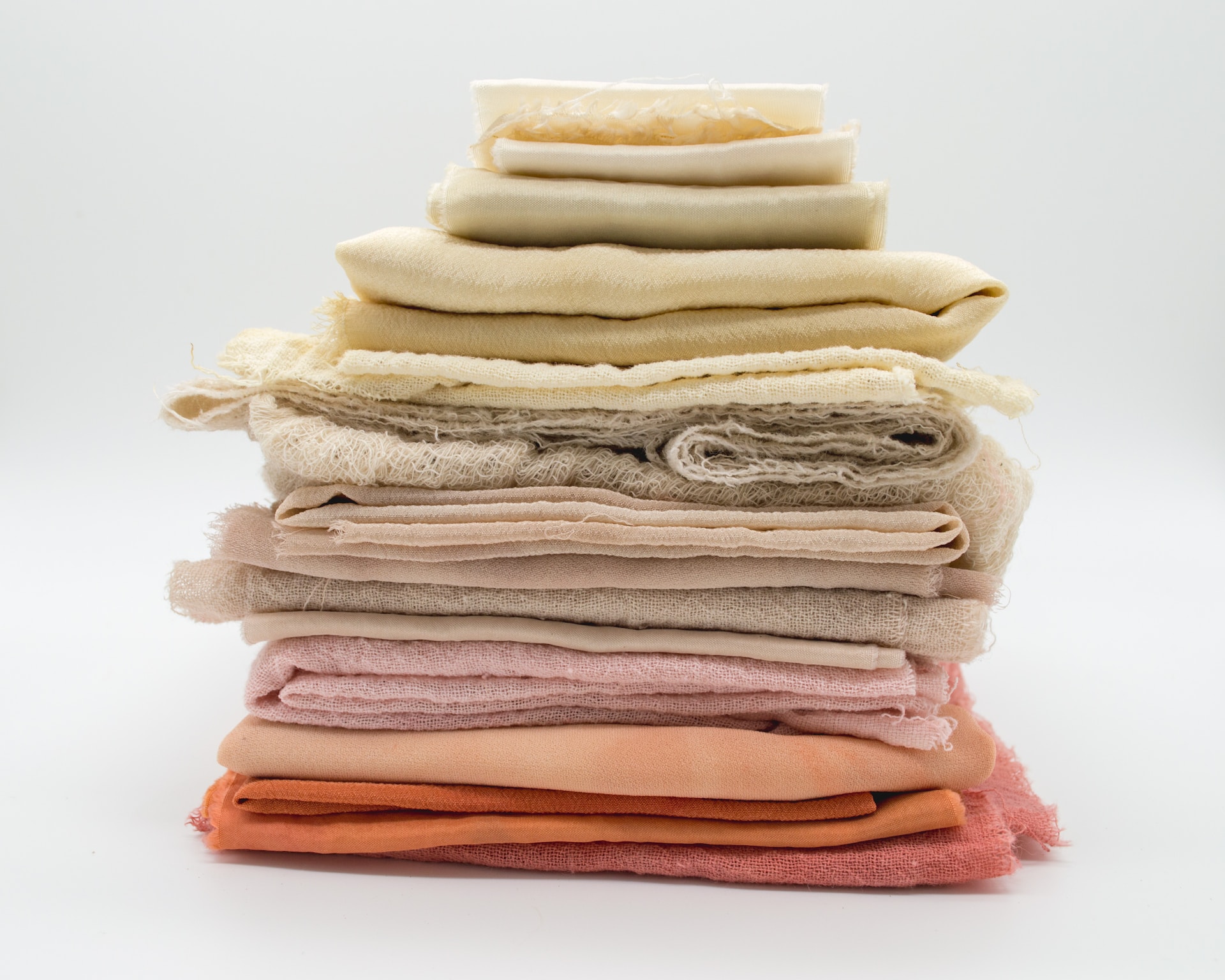|
|
Our lives are intricately woven with fabric, quite literally. From the shirt on your back to the sheets on your bed, cotton is a staple in our everyday existence. Yet, have you ever paused to ponder about the type of cotton that makes up your everyday essentials?
In this article, our focus shifts from just “cotton” to a more specific classification — “organic cotton.” The primary difference lies in how they’re grown. While regular cotton relies heavily on pesticides and synthetic fertilizers, organic cotton is cultivated using environmentally friendly farming practices. The benefits of organic cotton extend beyond just the environment; they seep into our health and economy as well.
In this article, we aim to unravel organic cotton’s advantages over regular cotton. We also journey through its environmental impact, delve into its health benefits, and explore the economic implications of choosing organic over conventional.
So, if you’re ready to learn why organic cotton deserves more than just a glance, read on!
Key Takeaways
- Organic cotton farming uses eco-friendly methods, reducing environmental harm and promoting biodiversity.
- Organic cotton safeguards consumer health and protects textile workers from toxic chemicals.
- Compared to other textiles, organic cotton has a lower environmental impact and is biodegradable.
- The higher price of organic cotton reflects its true cost, accounting for sustainable farming practices.
- Choosing organic cotton supports a sustainable lifestyle, contributing to a healthier planet and fair labor practices.
What Is Organic Cotton?
Organic cotton is a variant of the conventional cotton we’re all familiar with, but its cultivation is vastly different. It’s grown using methods and materials that have a low environmental impact, keeping the well-being of the planet at its core.
Organic cotton farming does not use toxic chemicals or genetically modified organisms. Instead, it often employs natural methods of pest management methods, and crop rotation to maintain soil health. The organic standards also prohibit the use of synthetic pesticides or fertilizers, ensuring the cotton remains free from harmful substances.
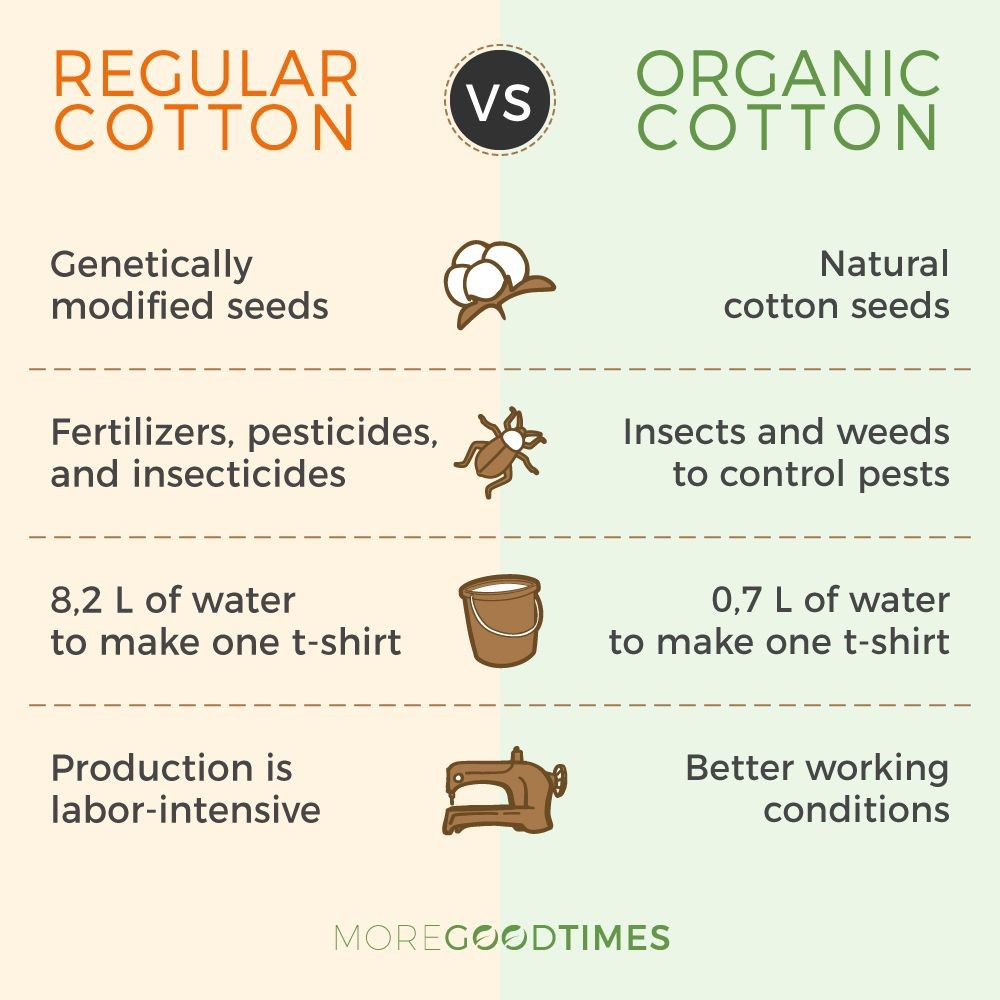
Moreover, organic cotton fields primarily depend on rainwater for irrigation, significantly reducing the water footprint compared to conventional cotton farming. This sustainable approach benefits not just the environment by preserving soil fertility and promoting biodiversity but also safeguards the health of farmers and consumers who would otherwise be exposed to toxic chemicals.
In essence, organic cotton is more than just a fabric; it’s a commitment to sustainability, a pledge to uphold environmental integrity, and an investment in our collective future.
Organic vs Regular Cotton
The contrast between organic and regular cotton lies primarily in their cultivation and processing.
Regular cotton is referred to as the world’s “dirtiest crop” due to its dependence on hazardous chemicals such as organophosphates, pyrethroids, neonicotinoids, and insecticides (chemicals used to control insects by killing them or preventing them from engaging in undesirable or destructive behaviors).
This type of cotton cultivation, which consumes around 24% of the world’s insecticides while accounting for just 2.5% of cultivated land, poses significant environmental and health risks.
Regular cotton is primarily genetically modified (GM cotton) and demands vast quantities of synthetic fertilizers. GM cotton is currently grown on 25 million hectares around the world, mostly in India, China, Pakistan, and the USA. Furthermore, growing enough cotton to make a single t-shirt requires one-third of a pound of these fertilizers.
On the other hand, organic cotton alleviates these concerns.
It provides an environmentally friendly alternative free of harmful chemicals, reducing pollution and exploitation. By choosing organic cotton for items like clothing or bedding, you safeguard your health, protect textile workers, and contribute to a more sustainable environment.
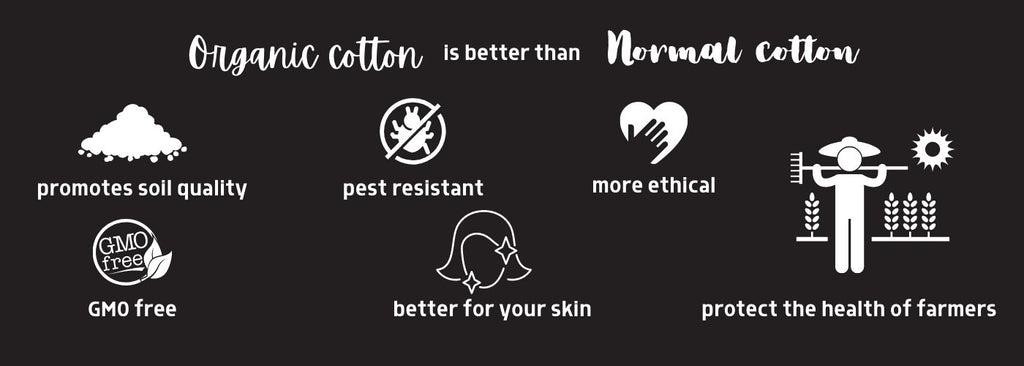
This environmentally conscious choice promotes a healthier lifestyle and a cleaner planet, providing all the benefits of cotton without the detrimental impacts of conventional farming methods.
Organic Cotton: Better Than Other Textiles?
Organic cotton holds a distinct advantage over many other textiles due to its sustainable farming practices and overall impact on the environment and health.
Compared to synthetic fibers like polyester or nylon, organic cotton is biodegradable, meaning it will naturally decompose over time instead of lingering in landfills for centuries. Conversely, synthetic fibers are petroleum-based products that require significant energy consumption for their production and release microplastics during washing, contributing to water pollution.
Compared with conventional cotton, organic cotton has a smaller water footprint, uses no chemical pesticides or fertilizers, and promotes biodiversity. These factors make it a healthier choice for both consumers and farmers, reducing exposure to potentially harmful agrochemicals.
Even when compared with other natural fibers like conventional linen or silk, organic cotton often still comes out ahead thanks to its overall lower environmental impact. Organic cotton farming practices also help maintain soil health and fertility, reduce water usage, and support ecosystems’ balance.
Additionally, organic cotton production emits up to 46% less greenhouse gas than non-organic cotton. It achieves this by eliminating the use of synthetic fertilizers – a significant source of nitrous oxide, a potent greenhouse gas.
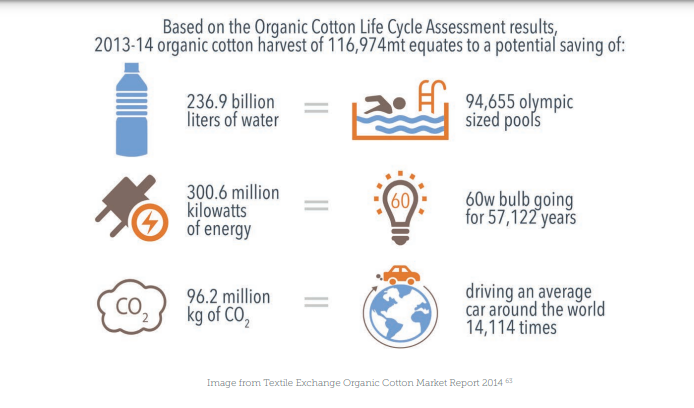
However, it’s essential to note that the sustainability of textiles also depends on other stages of their lifecycle, including manufacturing processes, dyeing techniques, transport emissions, and end-of-life disposal.
Consumers can further boost their eco-efforts by choosing brands that prioritize energy-efficient manufacturing processes, use natural dyes or no dyes at all, invest in carbon-neutral shipping methods, and promote recycling or upcycling initiatives.
Why Is Organic Cotton More Expensive?
Organic cotton generally comes with a higher price tag than regular cotton, and there are several reasons for this.
- Cost of certification. To be officially recognized as organic, farmers must obtain certification from approved organizations such as Global Organic Textile Standard (GOTS) or Organic Content Standard (OCS). This process involves rigorous inspections and compliance with strict standards, all of which come with substantial costs.
- Production costs. Organic farming methods are labor-intensive. Natural pest management, crop rotation, hand weeding, and the use of cover crops require more time and effort than conventional practices, increasing the overall cost of production.
- Lower yields. Organic cotton yields are typically lower than conventional cotton because they do not use genetically modified (GM) seeds designed to boost production. While these GM seeds can lead to higher yields in the short term, their long-term impact on soil health and biodiversity is negative.
- Supply and demand. The market for organic cotton is still relatively small compared to regular cotton. As demand increases and more farmers transition to organic practices, the price of organic cotton could potentially decrease.
While organic cotton products may initially seem more expensive, it’s crucial to consider the true cost of conventional cotton — environmental degradation, health risks due to exposure to toxic chemicals, and depletion of natural resources. In contrast, the price of organic cotton reflects its actual cost, accounting for sustainable farming practices that protect both people and the planet.
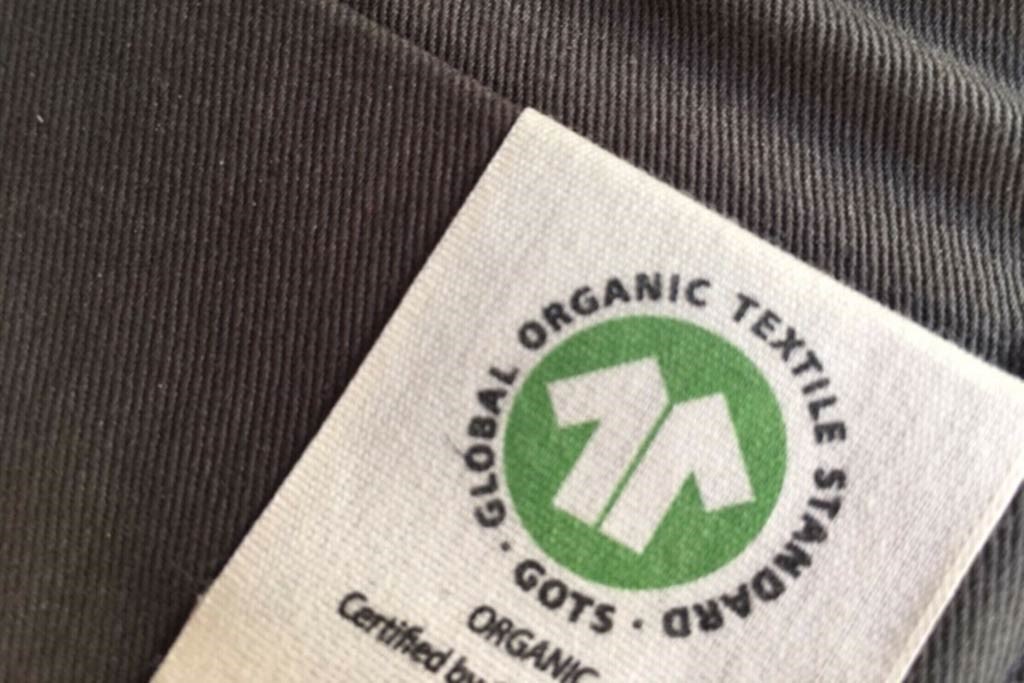
Making the Switch: How to Choose Organic Cotton Products
Moving towards an eco-friendly lifestyle often starts with making conscious choices. If you’re considering the switch to organic cotton, here are some tips to guide your shopping journey.
- Look for certifications. Trustworthy certifications like the Global Organic Textile Standard (GOTS) or Organic Content Standard (OCS) mentioned above ensure that the product is made of organic cotton. These certifications guarantee that strict environmental and social criteria have been met during the production process.
- Check product labels. Always read product labels carefully. Some products may claim to be ‘made with organic cotton’ but only contain a small percentage of it. Aim for 100% organic cotton whenever possible.
- Research brands. Not all brands claiming to be sustainable actually practice what they preach. Conduct thorough research to find out if a brand’s values align with yours. Look for transparency in their supply chains and commitment to ethical labor practices. Brands such as MATE, Pact, and Organic Basics can be a good start.
- Prioritize quality over quantity. Organic cotton products tend to be more durable and long-lasting than their conventional counterparts. Rather than buying multiple cheap items, invest in high-quality, organic pieces that will stand the test of time.
- Spread the word. Encourage others to switch to organic cotton by sharing your knowledge and experiences. The more people demand eco-friendly products, the more companies will strive to provide them.
Remember, every purchase matters. Choosing organic cotton is not just a personal choice; it’s a statement that supports sustainable farming practices and contributes to a healthier planet.
Final Thoughts
Organic cotton represents a sustainable, healthier, and socially responsible choice over regular cotton. Despite the higher upfront costs, the long-term benefits for the environment, health, and economy are vast.
It reduces the dependence on harmful pesticides and contributes to soil fertility, biodiversity, and water conservation while also lessening the exposure to toxic chemicals for farmers and consumers. Besides, it promotes fair labor practices and helps mitigate climate change.
Making the switch to organic cotton products is a significant step towards a more sustainable lifestyle, reflecting our commitment to protecting both people and the planet.
